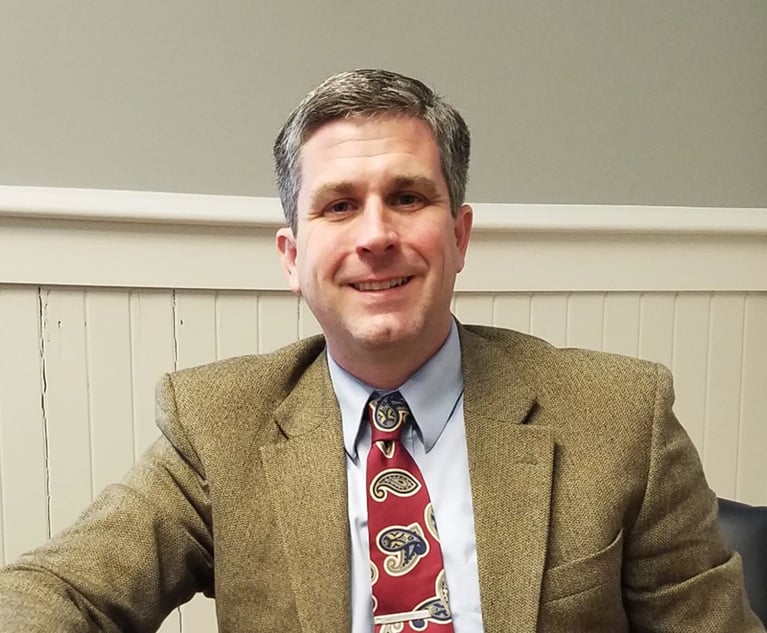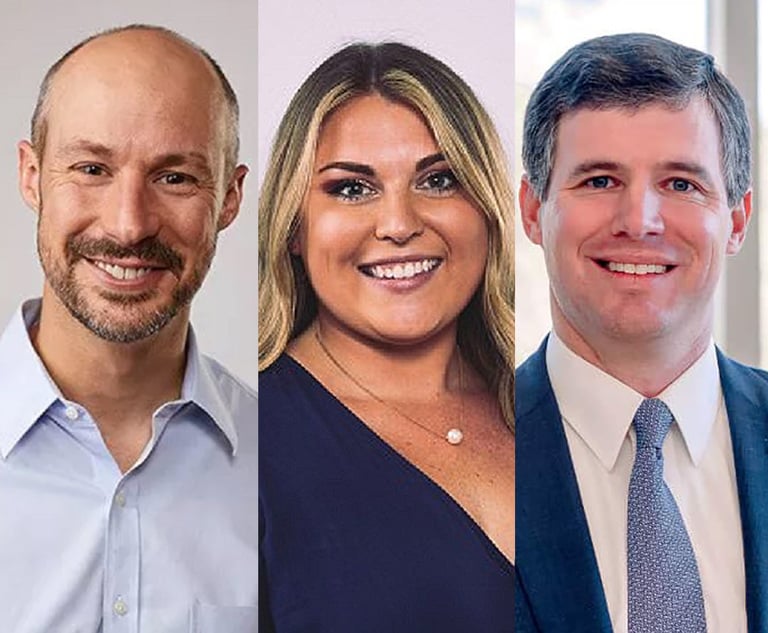Big Verdicts Come From Insurers' Behavior, Not Plaintiffs Lawyers' Tactics: Letter
When the insurance company rejects a reasonable settlement demand and forces the case to trial, it places the defense lawyer in an unwinnable situation.
May 19, 2020 at 01:25 PM
4 minute read
 (Photo: Bigstock)
(Photo: Bigstock)
It is rare for me to read an article in the Daily Report that I disagree with to the extent that I feel compelled to actually send in a response to set the record straight. But the recent story entitled "Reptile Co-Author Don Keenan Says Big Verdicts Reflect Justice" is such an article. In the article, Mr. Keenan claims that the recent "nuclear verdicts," a term adopted by the insurance industry for verdicts that significantly exceed their evaluations of a case, are the result of techniques that he has taught to lawyers as part of his Reptile theory that "persuade" jurors into thinking that the case is about something more than the client's injuries. I have never read Reptile. Neither has Pete Law or Jeff Shiver or other Georgia lawyers who have been counsel in these multimillion-dollar verdicts. I do not believe that "nuclear verdicts" exist. I am even more confident that any large verdict is not primarily attributable to the techniques used by the plaintiff's lawyer as much as the foreseeable result of the insurance industry placing the defense lawyer in an unwinnable position.
A "nuclear verdict" happens when an insurance company takes an unreasonable position in hopes of saving money on a serious injury or death case. The insurance company rejects a reasonable settlement demand from the victim because the amount sought is higher than what the insurance company wants to pay. The demand is in the range of a reasonable settlement for the injury or death, but the insurance company offers less in hopes that the victim will give up and take the money. This decision will ultimately be what leads to the "nuclear verdict." When the insurance company rejects a reasonable settlement demand and forces the case to trial, it places the defense lawyer in an unwinnable situation. The defense lawyer must find a way to hold the verdict below a reasonable settlement value in order to appease the insurance company. The defendant business owner sits through the trial recognizing that the insurance policy is inadequate to cover the damages and hopes the defense lawyer can work some magic. How can the defense lawyer keep a jury from awarding a reasonable amount? It is simply not possible. Georgia juries are too smart for that.
The defense lawyer when faced with this impossible task is required to take unreasonable positions at trial. He denies liability when it is clear that his client is at fault in causing the collision. He blames the victim when he or she did nothing wrong. He points the finger at nonparties who had nothing to do with the incident. It is not the defense lawyer's fault. He has no viable options to reach the unobtainable result ordered by the insurance company. What happens next is very predictable. During the trial, the jury is forced to sit through hours of testimony concerning defenses that make no sense to them and seem to be an insult to their intelligence. The jury can't understand why the defendant is denying responsibility. In closing arguments, after having insulted the jury with these defenses, the defense lawyer is required to ask the jury to return an unreasonably low verdict, or even worse, for a defense verdict with no award to the injured party in order to have a chance at keeping the verdict below the prior reasonable settlement demand that was denied by the insurer. The jury rejects the defense lawyer's arguments and gives an award that recognizes 100% of the loss suffered by the victim. The verdict comes in significantly higher than where the insurance company evaluated the exposure. Then the insurance company runs to the Legislature screaming that this is a "nuclear verdict" that no one could have anticipated. The insurance company always fails to mention that there was a reasonable settlement demand on the table and that they could have easily settled the claim before trial but didn't want to pay it.
These are not "nuclear verdicts." They are the logical result of taking illogical positions at trial. I do not know Mr. Keenan. I do not mean in any way to slight his Reptile theory or his techniques. I just know the sole cause of "nuclear verdicts" is insurance companies turning down reasonable demands and taking unwinnable cases to trial. If it was possible to force an insurance company to accept a reasonable demand, then you could make the "nuclear verdicts" disappear forever. But the good news for plaintiff's lawyers is that will never happen.
Michael Goldberg
Atlanta
This content has been archived. It is available through our partners, LexisNexis® and Bloomberg Law.
To view this content, please continue to their sites.
Not a Lexis Subscriber?
Subscribe Now
Not a Bloomberg Law Subscriber?
Subscribe Now
NOT FOR REPRINT
© 2025 ALM Global, LLC, All Rights Reserved. Request academic re-use from www.copyright.com. All other uses, submit a request to [email protected]. For more information visit Asset & Logo Licensing.
You Might Like
View All

DC Lawsuits Seek to Prevent Mass Firings and Public Naming of FBI Agents
3 minute read

Apply Now: Superior Court Judge Sought for Mountain Judicial Circuit Bench
3 minute readTrending Stories
- 1Dissenter Blasts 4th Circuit Majority Decision Upholding Meta's Section 230 Defense
- 2NBA Players Association Finds Its New GC in Warriors Front Office
- 3Prenuptial Agreement Spousal Support Waivers: Proceed With Caution
- 4DC Circuit Keeps Docs in Judge Newman's Misconduct Proceedings Sealed
- 5Litigators of the Week: US Soccer and MLS Fend Off Claims They Conspired to Scuttle Rival League’s Prospect
Who Got The Work
J. Brugh Lower of Gibbons has entered an appearance for industrial equipment supplier Devco Corporation in a pending trademark infringement lawsuit. The suit, accusing the defendant of selling knock-off Graco products, was filed Dec. 18 in New Jersey District Court by Rivkin Radler on behalf of Graco Inc. and Graco Minnesota. The case, assigned to U.S. District Judge Zahid N. Quraishi, is 3:24-cv-11294, Graco Inc. et al v. Devco Corporation.
Who Got The Work
Rebecca Maller-Stein and Kent A. Yalowitz of Arnold & Porter Kaye Scholer have entered their appearances for Hanaco Venture Capital and its executives, Lior Prosor and David Frankel, in a pending securities lawsuit. The action, filed on Dec. 24 in New York Southern District Court by Zell, Aron & Co. on behalf of Goldeneye Advisors, accuses the defendants of negligently and fraudulently managing the plaintiff's $1 million investment. The case, assigned to U.S. District Judge Vernon S. Broderick, is 1:24-cv-09918, Goldeneye Advisors, LLC v. Hanaco Venture Capital, Ltd. et al.
Who Got The Work
Attorneys from A&O Shearman has stepped in as defense counsel for Toronto-Dominion Bank and other defendants in a pending securities class action. The suit, filed Dec. 11 in New York Southern District Court by Bleichmar Fonti & Auld, accuses the defendants of concealing the bank's 'pervasive' deficiencies in regards to its compliance with the Bank Secrecy Act and the quality of its anti-money laundering controls. The case, assigned to U.S. District Judge Arun Subramanian, is 1:24-cv-09445, Gonzalez v. The Toronto-Dominion Bank et al.
Who Got The Work
Crown Castle International, a Pennsylvania company providing shared communications infrastructure, has turned to Luke D. Wolf of Gordon Rees Scully Mansukhani to fend off a pending breach-of-contract lawsuit. The court action, filed Nov. 25 in Michigan Eastern District Court by Hooper Hathaway PC on behalf of The Town Residences LLC, accuses Crown Castle of failing to transfer approximately $30,000 in utility payments from T-Mobile in breach of a roof-top lease and assignment agreement. The case, assigned to U.S. District Judge Susan K. Declercq, is 2:24-cv-13131, The Town Residences LLC v. T-Mobile US, Inc. et al.
Who Got The Work
Wilfred P. Coronato and Daniel M. Schwartz of McCarter & English have stepped in as defense counsel to Electrolux Home Products Inc. in a pending product liability lawsuit. The court action, filed Nov. 26 in New York Eastern District Court by Poulos Lopiccolo PC and Nagel Rice LLP on behalf of David Stern, alleges that the defendant's refrigerators’ drawers and shelving repeatedly break and fall apart within months after purchase. The case, assigned to U.S. District Judge Joan M. Azrack, is 2:24-cv-08204, Stern v. Electrolux Home Products, Inc.
Featured Firms
Law Offices of Gary Martin Hays & Associates, P.C.
(470) 294-1674
Law Offices of Mark E. Salomone
(857) 444-6468
Smith & Hassler
(713) 739-1250






